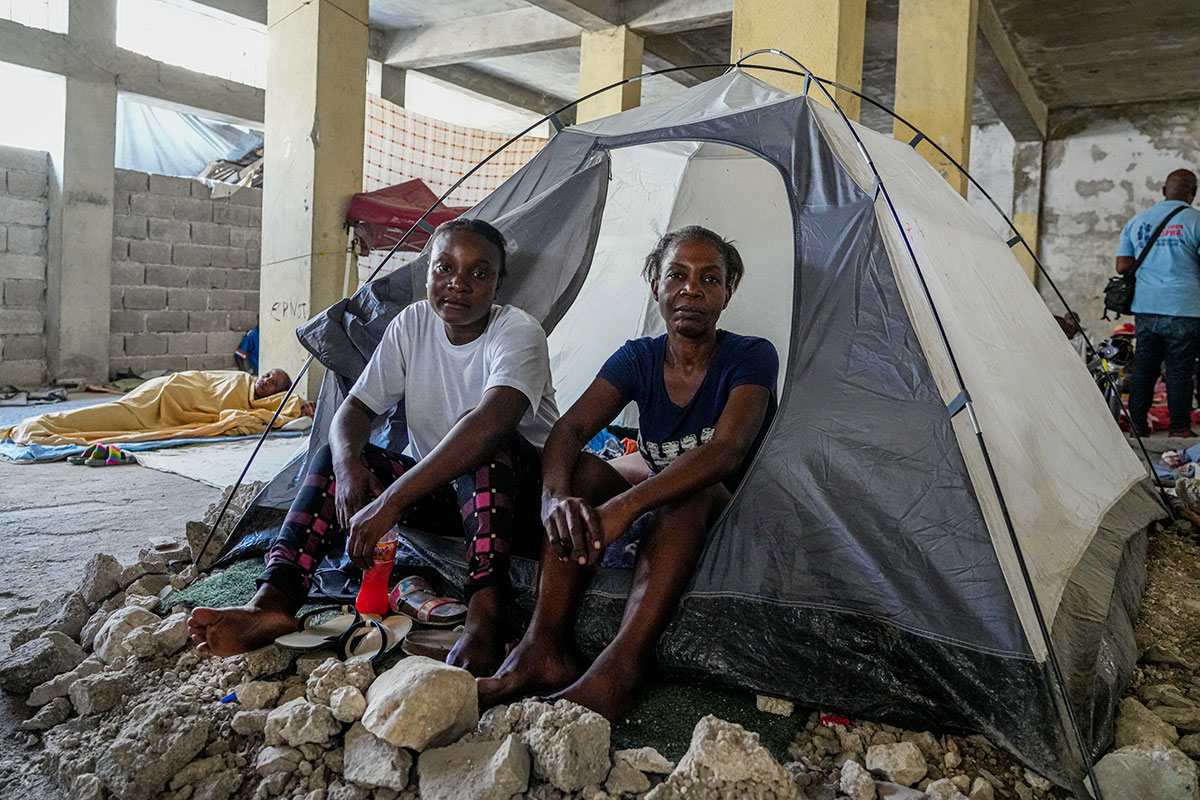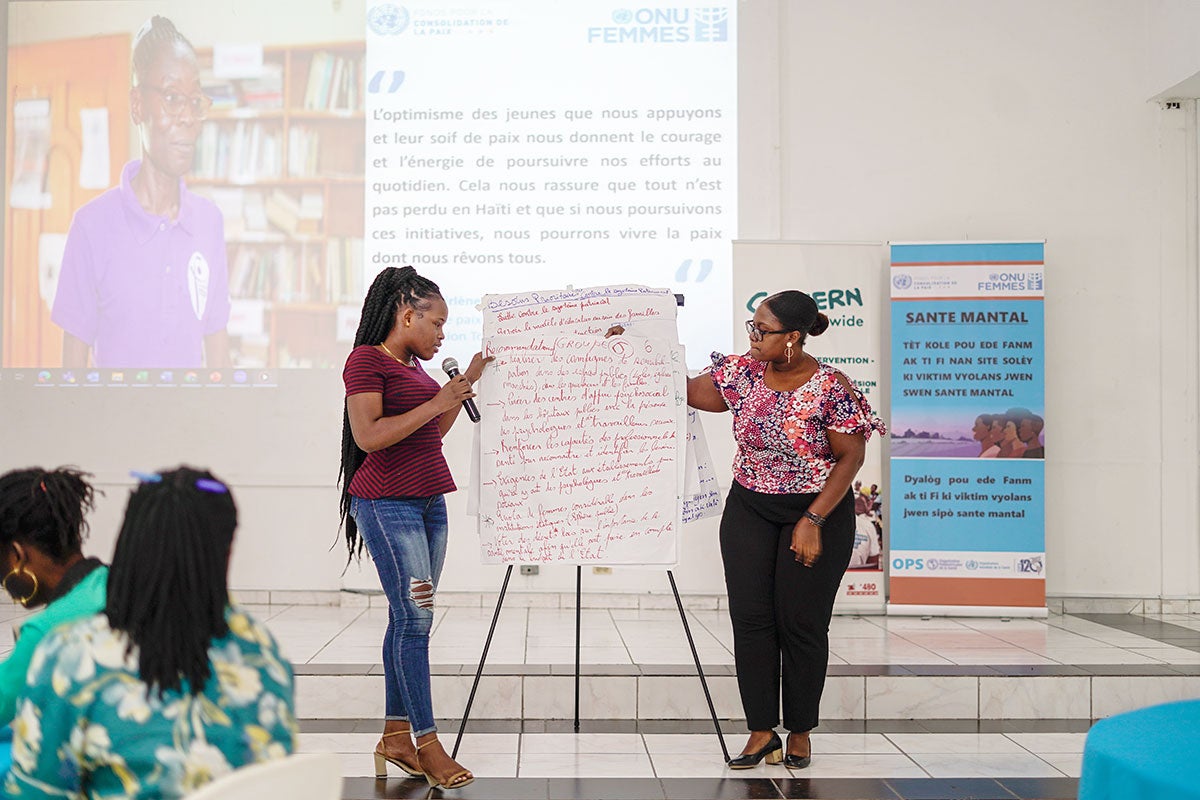Haitian women and girls empowered by UN Women amid humanitarian crisis
Civil unrest has led to a profound humanitarian crisis in Haiti, with more than 300,000 people displaced from their homes—including an estimated 170,000 children. Such displacement puts women and girls’ rights, economic prospects, and even their lives at risk.
Throughout this crisis, women’s groups have worked to remain active in Haiti, and UN Women is working with partner organizations to provide economic, psychological, and other forms of support to women and girls in the country.
Date:

One such project operates in Cité Soleil, in the metropolitan area of the capital city of Port-au-Prince. There, UN Women has partnered with Rapha International and local groups since late 2022, with funding from the UN Peacebuilding Fund, to provide emergency support to women survivors of sexual and gender-based violence, including counselling, medical assistance, relocation, and economic funding.
The programme also rolled out a secure web-based reporting system to allow victims of gender-based violence to connect with service providers securely and anonymously, seeking medical care, psychosocial services, rehousing, and economic support.
More than 2,000 people have used that system since its launch, which has led to 230 women and girls receiving food and hygiene kits while they fled from gang violence. Separately, a community-based referral programme has resulted in nearly 1,000 women and girls receiving aid, providing direct psychosocial support to 524 and other forms of assistance to 436 others.
The partnership with Rapha International also featured trainings for 10 community leaders and 86 other stakeholders, including school principals and hospital and clinic directors, to learn how to monitor for signs of sexual abuse and how best to report such cases.
Separately, in Haiti’s South Department, the Women's Peace and Humanitarian Fund—a partnership among the United Nations and local civil society groups—has funded a project giving some 54 rural women access to financial institutions for the first time by launching two Village Savings and Loan Associations, which are self-managed and self-capitalised savings groups that use members’ savings to lend to each other.
Such financial empowerment has given women greater independence and autonomy, which they had previously lacked.

“These women have now a stronger presence and representation in their community”, said Marc-Aurele François, Coordinator of MOJDDE, a local organization in the southern commune of Port-à-Piment that has worked with women recovering from a 2021 earthquake.
Also in the South Department, the National Associative Network for the Integration of Persons with Disabilities (RANIPH South), a partner of UN Women, has worked to expand its programming to reach people with disabilities by opening a new accessible workspace. The facility is now used by eight local organizations with a combined membership of 800 people, ranging from a local savings and loan association to women’s and disabled persons’ empowerment groups.
“This institutional support has significantly strengthened RANIPH's presence and enabled the organization to provide improved support to disabled individuals in the region”, RANIPH coordinator Semé Jean said, speaking of the UN Women partnership.
In the southern commune of Les Cayes, UN Women and the Women’s Peace and Humanitarian Fund have also supported a project aimed at helping women and girls learn entrepreneurial skills and gain more economic independence.
Since its launch in 2022, the project has reached 200 women and girls, providing them with trainings and advice on agricultural best practices, running a business, and other topics, including gender equality and women’s leadership. Dormevil Onicia, a 46-year-old mother of five who attended those trainings, said the programme not only gave her important skills, but that the classes on women’s rights made her feel more empowered.
“In the past, I was not used to participating in public meetings or speaking out in large groups. With the arrival of this project, I began to participate in the meetings organized by those in charge and the participatory and inclusive approaches used helped me a lot to be a fulfilled woman!” she said. “I am proud to have been part of this programme.”
Onicia said that the trainings encouraged her to switch from growing corn—which required a large amount of space—to breeding small livestock and sheep, as well as raising less resource-intensive crops and making use of composting and mulching techniques. The programme gave her seeds and technical assistance, as well as two sheep to launch her new business.
“With the right agricultural methods, I cultivated on less space than before and I earned more money”, she said, adding that she had also expanded her business to include a mill, where she grinds corn and cereal grains and then sells the ground products at a local market.
“Maize and millet waste are also sold to farmers, nothing is lost”, she said. “Using the income generated I pay school fees for my children, including my son who is in his first year of university.”
Another woman in Hati’s south, Florence, said that programming offered by UN Women, with support from the Women’s Peace and Humanitarian Fund and local partners had given her a second chance at life after surviving gender-based violence.
She attended the Strategic Support Unit for Agricultural Development (CASDA) programme, focused on empowering women who have survived gender-based violence. It included professional training, counselling, workshops on women’s empowerment and their rights, and initiatives aimed at strengthening their resilience and economic independence.
“My life was filled with fear and uncertainty. The violence I suffered left me without hope”, she said. “But thanks to the opportunity provided by CASDA, I was able to start my own small business. Today, I am proud to say that I am financially independent and that I can provide for the needs of my family.”
“This project has given me confidence in myself and in the future”, she said. “I am grateful to all those who have made this is possible.”